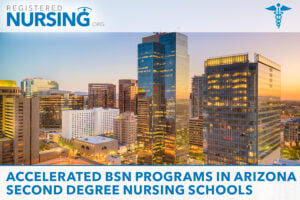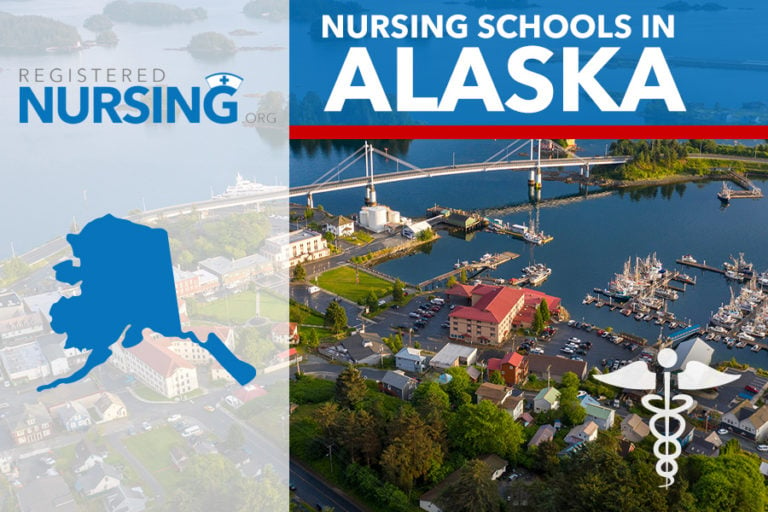A nursing career is not only a rewarding and meaningful career, but in Alaska, it can also be a great opportunity for garnering job security and a higher-paying salary. Alaska estimates a whopping 14% increase in nursing jobs by 2030 which means there are plenty of nursing jobs to go around. If you’ve wondered what it takes to become a nurse, or if you’re interested in nursing programs beyond entry-level, check out the sections below.
Alaska Nursing RN Programs – Diploma, ADN, and BSN Degrees
One of the great things about nursing education is that there are a variety of degree options based on your specific goals and background. Most students start at the entry-level options such as an Associate's Degree in Nursing (ADN), Bachelor of Science in Nursing (BSN), or a nursing diploma. These options are usually the most affordable, have fewer admissions requirements, and take less time to complete.
Comparing RN Diploma vs. LPN-to-RN vs. ADN Programs
ADNs, BSNs, and nursing diplomas are all great options for nurses who have no experience as a nurses, but what are the differences between these, and are there alternatives? If you’re looking for the fastest option, a nursing diploma or ADN usually takes the shortest amount of time (1 – 2 years) compared to a BSN which takes four years. If you’re already working as an LPN, you can also take advantage of an LPN to RN bridge program, which allows you to leverage your work experience in exchange for a shorter route to either ADN or BSN degrees.
Common admissions requirements for ADN and diploma programs in Alaska include:
- High School Diploma or GED
- Minimum GPA, typically 2.5 or higher
- Some programs require scores from the TEAS (Test of Essential Academic Skills) or HESI Admission Assessment
For further admissions requirements and more information, check out our page on ADN degree programs.
More information on RN diplomas, LPN to RN, and ADN programs:
| Program | Estimated Tuition | Estimated Credits | Online Availability |
|---|---|---|---|
| ADN | $6,000 – $15,000 | 60-72 credits | Limited online courses, primarily on-campus |
| LPN to RN | $4,000 – $10,000 | 30-45 credits | Often hybrid; some online courses |
| RN Diploma | $5,000 – $12,000 | 40-60 credits | Rarely online; primarily on-campus |
ADN, LPN to RN, and nursing diploma programs require hands-on clinical training hours under supervision in order to be eligible for RN licensure. These will need to be completed in person, even if you opt for an online or hybrid program. Not sure if you’re ready for an RN career? Consider an LPN or CNA program in Alaska.
Comparing Traditional BSN vs. RN to BSN vs. Accelerated BSN Programs
As you research the right program for you, you’ll likely come across three types of bachelor’s level options — an RN to BSN, traditional BSN, and accelerated BSN. If you’re not already working as a nurse and you’ve never gotten a bachelor before, you’ll want to go with the traditional option. If you already have a bachelor’s degree (even in an area that is not nursing, you can take advantage of ABSN programs, which allow you to get your BSN in a shorter amount of time. An RN to BSN program is designed for working nurses who are licensed to get their BSN in a shorter amount of time.
Admissions requirements for BSN programs in Alaska typically include:
- High School Diploma or GED
- Minimum GPA of 2.5-3.0
- Completion of prerequisite courses
For more information on BSN admissions requirements and more, see our BSN degrees page.
Several alternative pathways are also available to qualified students who want to pursue a BSN. Compare your options below:
| Program Type | Length/Credits | Estimated Cost (In-State) | Who It’s For |
|---|---|---|---|
| Traditional BSN | 4 years (120-126 credits) | $20,000 – $50,000 | First-time college students/career starters |
| RN to BSN | 1-2 years (30-35 credits) | $10,000 – $20,000 | Licensed RNs with an ADN |
| ABSN | 12-18 months (50-60 credits) | $25,000 – $40,000 | Bachelor's degree holders in another field |
RN to BSN
For RN bridge programs visit:
Licensed registered nurses don’t have to enroll for the full four years to get a BSN degree if they don’t want to. Alaska RN to BSN programs allow students to get their BSN in only 2 years as opposed to 4 years with a traditional BSN program. To enroll in this program, you’ll need an RN license and an ADN.
Accelerated BSN (ABSN)
Just because you’ve never worked in the nursing field before that doesn’t mean you can’t decide to get a nursing degree later on. If you already have a bachelor’s degree, even if it’s in a subject other than nursing, you can obtain a BSN in as little as a year as opposed to four years. These types of programs are known as ABSN programs.
Advanced Practice RN & Nurse Practitioner Programs
For some, becoming a registered nurse is a career in itself. However, many nurses who have been working at this level for several years may find that they need more independence and higher-paying salaries. If this sounds like you, there are educational options in Alaska that allow you to seek Advanced Practice Registered Nurses (APRN) licensure upon graduation. Nursing graduate degrees such as a Master’s Degree in Nursing (MSN) or a Doctorate Degree in Nursing (DNP) are the first step to seeking these positions.
Read more about advanced practice nursing programs in Alaska here:
Getting an RN License in Alaska
The final step in the process of becoming a registered nurse is getting licensed. RN licensure in Alaska is obtained by graduating from an accredited nursing program, passing the NCLEX-RN exam, and sending in an application. You will also be required to pay a fee to the Alaska Board of Nursing and follow up with your continuing education requirements to maintain licensure.
Requirements for RN Licensure in Alaska
- Completion of an accredited RN program (ADN or BSN)
- Passing the NCLEX-RN exam
- Application to the Alaska Board of Nursing
- Renewal: 36 hours of CE every three years for license maintenance
Why Choose an Accredited RN Program?
As you review nursing programs, you’ll want to make sure that the programs you apply to are accredited/ RN program accreditation in the US is provided by the Accreditation Commission for Education in Nursing (ACEN) and the Commission on Collegiate Nursing Education (CCNE), and any program that is not accredited by them will not meet the approval of the state board. As a consequence, any student who graduates from them will not be eligible for licensure.
Cities With Nursing Programs in Alaska
List of Nursing Schools in Alaska
Looking for nursing schools in Alaska? You're in the right place. Below, you'll find a list of schools across the state offering nursing programs. Each entry includes the city and state, highlights of what the program offers, and a link to learn more. Whether you're starting your nursing career or looking to advance, these programs can help you reach your goals. Check them out to find the best fit for your education and career path.
Anchorage, AK
Alaska Pacific University
- Bachelor's - RN to Bachelor of Science in Nursing
Online Learning - Website
- Online program
- Cultural competence focus
- Flexible distance delivery
- Minimum GPA 2.5 required
- RN license required
- Official transcripts needed
- Foundational studies included
- Major studies in nursing
Charter College
- Associate - Associate of Applied Science in Nursing
Online & Campus Based - Website
- 19-month program length
- Hybrid learning format
- Prepares for NCLEX-RN exam
- High demand in Alaska
- Flexible class schedules
- Hands-on clinical rotation
- Comprehensive nursing curriculum
- Accredited by ACEN
University of Alaska Anchorage
- Bachelor's - Bachelor of Science in Nursing
Online & Campus Based - Website
- Hybrid program format
- Two tracks available
- ACEN accredited
- Minimum GPA 3.00 for pre-licensure
- Minimum GPA 2.00 for RNs
- Focus on evidence-based practice
- Prepares for NCLEX-RN
- Foundation for graduate study
Latest Articles & Guides
One of the keys to success as a registered nurse is embracing lifelong learning. Our articles and guides address hot topics and current events in nursing, from education to career mobility and beyond. No matter where you are on your nursing journey, there’s an article to help you build your knowledge base.
Browse our latest articles, curated specifically for modern nurses.




